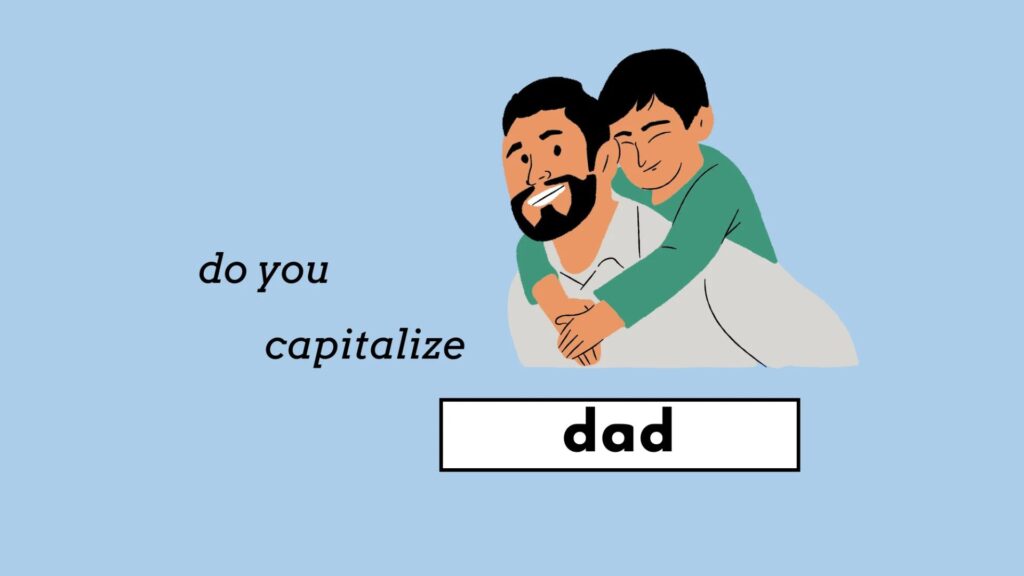When writing casually or formally, one question trips up even advanced English learners: Do you capitalize “Dad” in a sentence? The short answer is it depends. Capitalization rules in English aren’t just about grammar; they also reflect meaning, context, and how a word functions in a sentence.
In this article, we’ll break it down using clear examples, real-world email scenarios, and explain every rule you need to remember about when to capitalize “Dad” and when not to.
Keyword + Intro Explanation

Let’s start with the core question: Is “Dad” a proper noun?
Sometimes, yes. Sometimes, no.
The word “Dad” can be both a proper noun and a common noun, and that’s what determines whether you should capitalize it. The same goes for related terms like Mom, Sister, Grandpa, and Uncle.
The capitalization rule depends on how the word is used in the sentence not just the word itself.
Simple Definition + Usage Overview
- When “Dad” replaces a name, you capitalize it.
- When “dad” is used with a possessive (like my, your, or his), it’s considered a common noun and should be lowercase.
Here’s a quick test:
Can you substitute “Dad” with his actual name (like John)?
If yes, then it should be capitalized.
Clear Rules & Patterns
Here are the key rules to follow when deciding whether to capitalize “Dad”:
🔹 Rule 1: Capitalize when used as a proper noun (name substitute)
Correct: I asked Dad to pick me up after school.
Why? “Dad” is standing in for his name.
🔹 Rule 2: Don’t capitalize when used as a common noun with a possessive
Correct: My dad picked me up after school.
Why? The word “dad” is preceded by a possessive determiner (“my”).
🔹 Rule 3: Capitalize in direct address
Correct: Can you help me with this, Dad?
Why? You’re speaking directly to him and addressing him as a proper noun.
Bulleted Rules with Do’s and Don’ts
✅ Do Capitalize “Dad” When:
- It’s used in place of a name
- It appears in direct speech or dialogue as a form of address
- It stands alone as the subject of the sentence
❌ Don’t Capitalize “dad” When:
- It follows possessive pronouns (my, our, your, her, his)
- It refers to the role in general terms, not a specific person
- It’s part of a descriptive phrase, not a title
Multiple Example Sentences
Here’s how these rules work in real-world usage:
| Correct Usage | Incorrect Usage |
|---|---|
| I’m going to ask Dad if we can go. | I’m going to ask dad if we can go. |
| Dad said it’s time to eat. | dad said it’s time to eat. |
| My dad is an engineer. | My Dad is an engineer. |
| Can you help me with this, Dad? | Can you help me with this, dad? |
Email Scenario: Formal & Informal Examples
Let’s look at two emails one where “Dad” is capitalized, and one where it’s not.
✉️ Email Example 1: Capitalized (Used as Name)
To: Julie Harrison
Subject: Update on Travel PlansHi Julie,
Just letting you know that Dad will be arriving tomorrow evening around 6 p.m. He’s taking the early train from Boston.
Let me know if you need help picking him up.
Best,
Megan
🔍 In this case, “Dad” replaces his name so it’s capitalized.
✉️ Email Example 2: Lowercase (Common noun)
To: Mr. Thomas
Subject: Student AbsenceHello Mr. Thomas,
My dad had to take me to a doctor’s appointment this morning, so I missed first period. I’ll catch up on the assignments tonight.
Thanks for understanding.
Best regards,
Olivia
🔍 Here, “dad” follows the possessive “my,” making it a common noun.
Before/After Examples in Everyday and Formal Contexts
Let’s compare a few before-and-after fixes in different writing contexts.
📝 Everyday Conversation
❌ I was talking to dad about the game.
✅ I was talking to Dad about the game.
📝 Descriptive Narrative
❌ Dad’s cooking is legendary.
✅ My dad’s cooking is legendary.
📝 Formal Writing
❌ In his early years, Dad served in the navy.
✅ In his early years, my dad served in the navy.
Common Mistakes & Fixes
Let’s tackle some frequent grammar errors tied to this issue:
| Mistake | Fix |
|---|---|
| Is “dad” supposed to be capitalized always? | No only when used as a proper noun. |
| I wrote: “My Dad went to work.” | Change to: “My dad went to work.” |
| I said: “dad, can you help me?” | Change to: “Dad, can you help me?” |
| Is “father” capitalized in a sentence? | Same rule as “dad.” Depends on usage/context. |
Quick Reference Table
| Word | Capitalized? | When to Use |
|---|---|---|
| Dad | ✅ Yes | When used as a name or title |
| dad | ❌ No | When used with a possessive (e.g., my, his) |
| Father | ✅ Yes | When used as a proper noun title (e.g., “Father John”) |
| father | ❌ No | When used in general or with a possessive |
How to Use Dad in a Sentence
Here are more example sentences with “dad” to show different contexts:
- Ask Dad if he can help with the lights.
- I think my dad used to live in this neighborhood.
- “Let’s go fishing this weekend,” Dad said.
- A dad should always be there for his kids.
These show when “Dad” functions as a proper noun vs a common noun a crucial distinction in English grammar.
Capitalization Rule Worksheets & Learning Tools

Need a resource for practice? Look for:
- Capitalization rules for family titles worksheets
- Grammar lessons on proper vs common nouns
- Interactive tools that explain when to capitalize dad
Final Thoughts: Grammar Rules for “Dad”
So is “Dad” a proper noun?
Yes, when it’s used like a name.
No, when it follows a possessive or is used generically.
Remember:
“I’m going to ask Dad for the keys.” ✅
“My dad always gives great advice.” ✅
Both are correct. It’s the context that matters.
When in doubt, ask yourself:
Is “Dad” being used as a name?
If yes capitalize it.
By following these capitalization rules for family titles, you’ll not only write more clearly you’ll also avoid one of the most common grammar mistakes in English.
Want to be extra sure? Read it aloud. If it sounds like a name, capitalize Dad.

